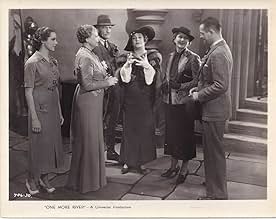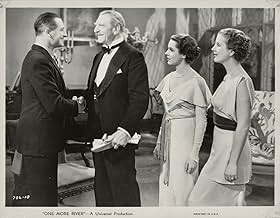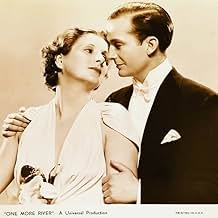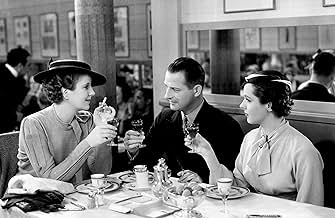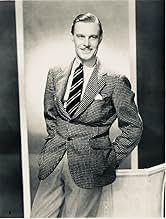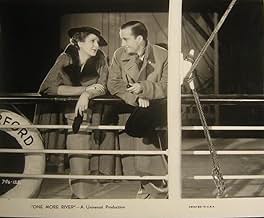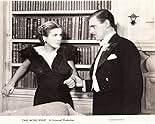अपनी भाषा में प्लॉट जोड़ेंA young lady leaves her brutal husband and meets another man aboard a ship.A young lady leaves her brutal husband and meets another man aboard a ship.A young lady leaves her brutal husband and meets another man aboard a ship.
- निर्देशक
- लेखक
- स्टार
फ़ीचर्ड समीक्षाएं
Today, 1930s director James Whale is best remembered for "Frankenstein", "The Invisible Man", and "The Bride of Frankenstein", as well as for being probably the only openly gay person in cinema at the time (Ian McKellen played him in 1998's "Gods and Monsters"). Lesser known are Whale's dramas. There was "Waterloo Bridge", about a relationship strained by World War I, and "One More River", about a woman who flees an abusive marriage and hooks up with someone else. Not something usually depicted back then, so I wonder if it would've even been possible once the Hays Code went into effect the following year.
It's not a masterpiece, but passable. I find these fetishistic looks at the British ruling class weird (especially considering Whale's dirt-poor childhood). I suppose that nowadays, such a movie - whether focusing on the working class or ruling class - would probably come from Pedro Almodovar. Diana Wynyard, Jane Wyatt, Colin Clive (Dr. Frankenstein in Whale's more famous movies) and Frank Lawton all turn in fine performances.
It's not a masterpiece, but passable. I find these fetishistic looks at the British ruling class weird (especially considering Whale's dirt-poor childhood). I suppose that nowadays, such a movie - whether focusing on the working class or ruling class - would probably come from Pedro Almodovar. Diana Wynyard, Jane Wyatt, Colin Clive (Dr. Frankenstein in Whale's more famous movies) and Frank Lawton all turn in fine performances.
"Claire" (Diana Winyard) is married to aspiring politician "Sir Gerald" (Colin Clive) but he's a bit of a brute. It's an incident with a riding crop that finally sends his wife on a cruise where she encounters "Croom" (Frank Lawton). Unfortunately, her husband cannot be seen to not have his wife at his side and so when she flatly refuses a reconciliation, he sets in motion a public divorce that will call the integrity of not just her, but of her new companion into question. Of course, though still entirely platonic, we know that the relationship between the two has burgeoned somewhat - but this isn't really a film about a romance. It's a rather sad indictment of a judicial system that still looked upon a woman as the property of her husband. Not in a feudal sense, but that she might accuse such a prominent and respectable man of ill-treating her was a charge that was always going to fall on deaf ears. It's the ensuing court hearing that brings this to life a bit, with some sparky sparring from lawyers "Brough" (Lionel Atwill), "Forsythe" (Alan Mowbray) and the inquisitive judge (Gilbert Emery) quite cleverly showcasing the one-sidedness of the whole affair. The film also befits from a great cast of supporting favourites who feature sparingly but add depth to a story of state-supported prejudice that Winyard holds together quite well.
This is a superior film, but its impact is attenuated by the great changes in social attitudes toward sex and divorce which have occurred since the time it was filmed. The conflicts and tensions in the story could only occur today in third world nations or very religious communities. Thus, most American viewers can wonder what all the excitement is about.
Diana Wynyard is a revelation. When the film began, she appeared a bit on the plain side. However, she became enchantingly beautiful as the movie progressed. Her soft, pleasant, kind features and the exquisite shape of her head and body impressed me more and more, as did her calm manner and then her assertive testimony in court.She became irresistible.
Universal gave this a veneer of a prestige production. It looked like it was shot in England, except that most of the English performers were already old Hollywood hands. Jane Wyatt wisely didn't try for an English accent. Whales' direction was seamless, but not as flashy as his more famous horror productions. He kept things moving briskly.
Diana Wynyard is a revelation. When the film began, she appeared a bit on the plain side. However, she became enchantingly beautiful as the movie progressed. Her soft, pleasant, kind features and the exquisite shape of her head and body impressed me more and more, as did her calm manner and then her assertive testimony in court.She became irresistible.
Universal gave this a veneer of a prestige production. It looked like it was shot in England, except that most of the English performers were already old Hollywood hands. Jane Wyatt wisely didn't try for an English accent. Whales' direction was seamless, but not as flashy as his more famous horror productions. He kept things moving briskly.
One More River (1934)
*** (out of 4)
This James Whale directed melodrama is technically good and the performances are fine but I'd still rank it rather low in regards to the director's filmmography. A woman (Diana Wynyard) goes to England to try and escape her abusive husband (Colin Clive) and on the ship ride over has a nice man (Frank Lawton) fall in love with her. Even though her husband is abusive, she refuses to go any further with the new man and it doesn't take long for the husband to show up and cause trouble. ONE MORE RIVER was based on a very popular novel that of course had to be trimmed down for the big screen due to the production code going into full swing during this period. For the most part I thought the film featured some very good performances from its excellent cast and there's no question that it's rather impressive on a technical side. The biggest issue I had with the film was actually the pacing, which just seemed extremely slow to me and it really took forever for the film to finally pick up some speed. There's no question that the material is old-fashioned but this isn't the reason it goes so slow. Again, the best thing going are the performances with Wynyard really standing out as the abused woman trying to do what's right. Lawton is also good in his role as the man who loves her and Clive proves what a talent he was in just a few scenes. Jane Wyatt appears in his first role and we get good support from Reginald Denny, Henry Stephenson, Lionel Atwill and C. Aubrey Smith.
*** (out of 4)
This James Whale directed melodrama is technically good and the performances are fine but I'd still rank it rather low in regards to the director's filmmography. A woman (Diana Wynyard) goes to England to try and escape her abusive husband (Colin Clive) and on the ship ride over has a nice man (Frank Lawton) fall in love with her. Even though her husband is abusive, she refuses to go any further with the new man and it doesn't take long for the husband to show up and cause trouble. ONE MORE RIVER was based on a very popular novel that of course had to be trimmed down for the big screen due to the production code going into full swing during this period. For the most part I thought the film featured some very good performances from its excellent cast and there's no question that it's rather impressive on a technical side. The biggest issue I had with the film was actually the pacing, which just seemed extremely slow to me and it really took forever for the film to finally pick up some speed. There's no question that the material is old-fashioned but this isn't the reason it goes so slow. Again, the best thing going are the performances with Wynyard really standing out as the abused woman trying to do what's right. Lawton is also good in his role as the man who loves her and Clive proves what a talent he was in just a few scenes. Jane Wyatt appears in his first role and we get good support from Reginald Denny, Henry Stephenson, Lionel Atwill and C. Aubrey Smith.
This is one of Whale's favorites among his own works (the director even gave himself an uncredited bit!) but which he only got Universal to bankroll by accepting to helm another fantasy project for them, the subsequently aborted "A Trip To Mars". Anyway, this obscurely-titled melodrama is based on John Galsworthy (best-known for "The Forsythe Saga")'s last novel – adapted by the equally distinguished R.C. Sheriff. It tells of the vicissitudes of a young wife (Diana Wynyard, fresh from an Oscar nomination for the previous year's Best Picture winner CAVALCADE), about to be divorced from her brutish husband (a brief but typically impressive turn from Whale regular Colin Clive), who unwittingly adds coal to the fire via her initially platonic relationship with a young man (Frank Lawton, soon to play his most notable role as the grown-up David COPPERFIELD [1935]). The narrative also has a strong political element to it, not just in view of the subplot involving the electoral climate (personified by Reginald Denny's newly-appointed MP), but in the heroine's emancipation from the rigid status quo pertaining to woman's role in society.
While undeniably dated, the film boasts splendid cinematography and sets (by BRIDE OF FRANKENSTEIN's John J. Mescall and Charles D. Hall respectively) – the latter would be memorably refurbished and re-used for the Mary Shelley prologue and the Baron's own abode in that very film which rather suggests that the art director/set decorator's craft is not nearly appreciated enough! Apart from this, we get a truly remarkable supporting cast: lovely Jane Wyatt (as Wynyard's kid sister), C. Aubrey Smith (their father), Henry Stephenson (an uncle), the oddly-named Mrs. Patrick Campbell (hamming it up as his outspoken wife – apparently, she was like that in real-life too!), Lionel Atwill (the wily but pompous Prosecutor), Alan Mowbray (the defense counsel), Gilbert Emery (the genial Judge) and E.E. Clive (the other Clive's resourceful private detective).
Finally, the copy I acquired was sourced from an old TV broadcast off the U.K.'s Channel 4: despite a couple of intermissions for publicity spots(!), the quality is surprisingly adequate – much better, in fact, than that for most of the other Whales I have been watching lately.
While undeniably dated, the film boasts splendid cinematography and sets (by BRIDE OF FRANKENSTEIN's John J. Mescall and Charles D. Hall respectively) – the latter would be memorably refurbished and re-used for the Mary Shelley prologue and the Baron's own abode in that very film which rather suggests that the art director/set decorator's craft is not nearly appreciated enough! Apart from this, we get a truly remarkable supporting cast: lovely Jane Wyatt (as Wynyard's kid sister), C. Aubrey Smith (their father), Henry Stephenson (an uncle), the oddly-named Mrs. Patrick Campbell (hamming it up as his outspoken wife – apparently, she was like that in real-life too!), Lionel Atwill (the wily but pompous Prosecutor), Alan Mowbray (the defense counsel), Gilbert Emery (the genial Judge) and E.E. Clive (the other Clive's resourceful private detective).
Finally, the copy I acquired was sourced from an old TV broadcast off the U.K.'s Channel 4: despite a couple of intermissions for publicity spots(!), the quality is surprisingly adequate – much better, in fact, than that for most of the other Whales I have been watching lately.
क्या आपको पता है
- ट्रिवियाAccording to Jane Wyatt, "[James Whale] was crazy about Mrs. Pat [Mrs. Patrick Campbell]. The set was kind of run for her. The whole thing was to get her relaxed. She was playing up a lot about how nervous she was, and I think she got an awful lot of attention that way. i think we felt sorry for Mrs. Campbell. Poor dear--how ever are they going to pull her together. That was my reaction. We all had to pull her together and help her through.
- गूफ़In the opening scene, the liner pulling into the London dock that lady Corven arrives on is seen in the establishing shot is clearly named the ORFORD, yet after a we see her and Tony speak on the deck, another establishing shot of the ship now shows it is one called the ORSOVA.
- कनेक्शनReferenced in Gods and Monsters (1998)
टॉप पसंद
रेटिंग देने के लिए साइन-इन करें और वैयक्तिकृत सुझावों के लिए वॉचलिस्ट करें
विवरण
- चलने की अवधि1 घंटा 28 मिनट
- रंग
- पक्ष अनुपात
- 1.37 : 1
इस पेज में योगदान दें
किसी बदलाव का सुझाव दें या अनुपलब्ध कॉन्टेंट जोड़ें

